At first Alex did not want to dope. The Kenyan runner wanted to compete clean, earn an honest living, and lift his family out of poverty through grit and determination.
However, his resolve crumbled as he realized that he could not match his opponents, athletes that he knew were doping and beating the system set up to catch drug cheats.
Soon, Alex was boosting his performance with erythropoietin (EPO), a substance banned by the world doping watchdog, but poorly regulated in Kenya.
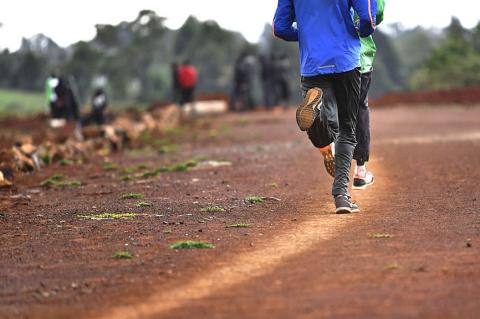
Photo: AFP
“I had to use it, in order to earn a living. You cannot compete with people already using and expect to earn something reasonable,” said Alex, who spoke on condition of anonymity and asked that his name be changed. “Sport today is not clean.”
Kenyans are legendary marathoners, making up 38 of the world’s top 100 runners this year, but the country’s anti-doping authorities have struggled to stamp out a culture of drug use in its fabled athletic fraternity.
Alex trains in Iten, hallowed ground for aspiring Kenyan runners who dream of following their idols from the high plateau above the Rift Valley to the Olympic podium and the record books, but most do not make the big league.
Nearly a thousand Kenyans earn a living competing in marathons across the globe, according to the Athletics Integrity Unit, runners whose times — although unnoteworthy at home — would make them stars anywhere else.
They are not taking home the tens of thousands on offer at major marathons, but pick up a few hundred, maybe the odd thousand, in second and third-tier races.
These prizes are fiercely coveted by the enormous pool of talented Kenyans. Placing anywhere high-up could support whole families for months, in a country where many live on little more than US$1 a day.
It is among this class of competitor — professional grade, but not elite — that doping is most rampant and unchecked, athletes said.
“You don’t have to be an elite athlete, be on the national team, go to the big races, to make money,” said a pharmacist in Eldoret, a city near Iten, who sells EPO to runners for US$20 a dose.
Kenya was forced to confront its doping problem in 2016 when a string of high-profile scandals almost saw the country blacklisted from the Rio Olympic Games.
It scraped through, promising to stamp out cheating through tough new laws penalizing users and dealers, and a newly established anti-doping agency (ADAK).
Drug tests jumped 10-fold in a matter of years. A blood testing laboratory approved by the World Anti-Doping Authority (WADA) opened in Nairobi last year. For the first time, Kenya was able to create biological passports for about 40 of its top athletes.
Big names — including Olympic gold medalists Jemima Sumgong and Asbel Kiprop — were among the Kenyan stars to test positive in the years after the Rio scare, but a whole class of international-grade runners, one step below the best, have gone virtually undetected.
These athletes are not subjected to regular testing by ADAK, which does not have the funds or manpower to monitor such a huge pool of runners.
“It is simple: we need to do more tests,” ADAK head Japhter Rugut said.
Many race organizers cannot afford to run comprehensive drug tests for all competitors, so they eschew it altogether.
Tony, another athlete who admits to doping, opts to compete in these races where scrutiny is low or non-existent.
If there is testing in place, he avoids placing in the top three to evade suspicion, he said.
Tony trains in a squad of 15 runners in Iten — at least a quarter of whom are doping, he estimated.
“If people stop cheating, I’ll stop. I cheat because others have cheated,” said Tony, not his real name.
Tony said he knew there were dangers “and I could die anytime.”
“But I take the risk,” he added. “I have to take care of myself and my brothers and sisters.”
Many athletes are convinced there is no point going clean, because the system is rigged from the top down.
“In Kenya, most people are corrupt. To get rid of doping or cheating in athletics, you have to fight corruption first,” Tony said.
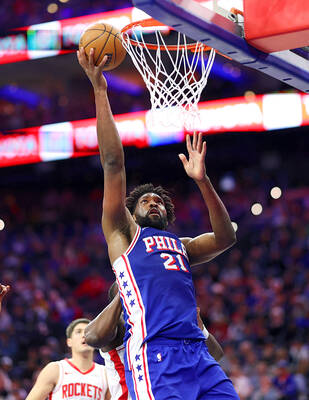
The Philadelphia 76ers, fueled by 36 points from Tyrese Maxey and a triple-double from Joel Embiid, on Thursday beat the Houston Rockets 128-122 in an NBA overtime thriller. Cameroonian big man Embiid scored 32 points, grabbed 15 rebounds and handed out 10 assists, posting the ninth triple-double of his career to help the Sixers end the Rockets’ three-game winning streak. Rockets star Kevin Durant scored 36 points and Amen Thompson added 17, but Thompson was scoreless in the fourth quarter. Even so, the Rockets led by nine midway through the final frame, Maxey tying it at 115-115 with 40.1 seconds left. Durant missed a
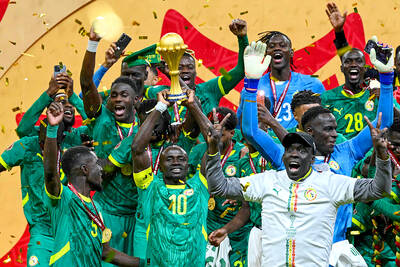
MARRED FINAL: As most of Senegalese players walked off the pitch after a controversial decision, some supporters threw objects and attempted to get onto the pitch Senegal on Sunday won the Africa Cup of Nations (AFCON) as Pape Gueye’s extra-time winner sunk hosts Morocco 1-0 after a chaotic final that saw the eventual champions storm off the pitch late in the game. Brahim Diaz could have won the trophy for Morocco with a controversial spot-kick in the 24th minute of added time at the end of normal time as ugly scenes broke out in the stands. However, Senegal goalkeeper Edouard Mendy easily saved the weak attempted “Panenka” chip by the Real Madrid winger, who was clearly distracted by the long delay that followed the penalty award.
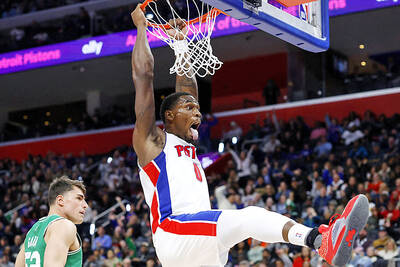
Tobias Harris on Monday scored 25 points as the Detroit Pistons held off the Boston Celtics to score a 104-103 victory in their top-of-the-table Eastern Conference showdown. Harris was one of four Detroit players to finish in double figures, with Jalen Duren adding 18 points and point guard Cade Cunningham scoring 16 points with 14 assists. The win sees Detroit extend their lead at the top of the Eastern Conference to 31-10, 5.5 games ahead of second-placed Boston, who fell to 26-16 with the defeat. Jaylen Brown led the Celtics scoring with 32 points and almost snatched victory in the
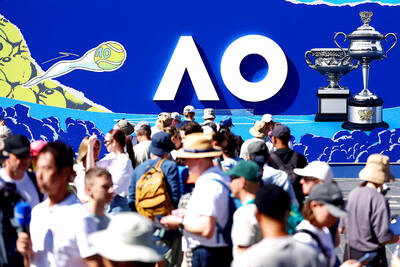
The civil war engulfing tennis has been laid bare on the opening day of the first Grand Slam event this year, with details of Tennis Australia’s peace deal with the Professional Tennis Players’ Association (PTPA) published for the first time. The PTPA last year launched an anti-trust lawsuit against the four grand slam tournaments, the ATP Tour, WTA Tour, and the International Tennis Federation, accusing them of collaborating to reduce prize money, impose a restrictive ranking system and repress player promotional opportunities, but Tennis Australia was dropped from the claim last month after reaching a settlement agreement with the players’